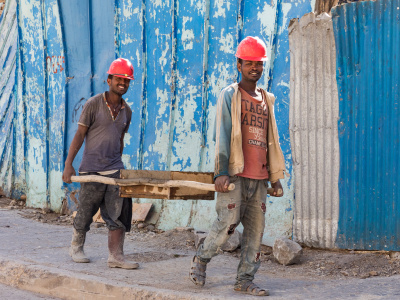
A chance to get it right: Challenges for Africa-Europe relations in 2018
This paper aims to inform the discussions on Africa-Europe relations at the start of the year when there is still time to steer existing cooperation frameworks closer. The first section sets the stage for the post-Cotonou deliberations. The paper then addresses the implications of the EU’s and AU’s institutional agendas for the upcoming negotiations.
This page is also available in French.
Summary
2018 presents a once-in-a-decade opportunity for Europe and Africa to arrive at a more coherent partnership, bridging the political, institutional and financial limitations of the frameworks that now regulate their cooperation. In September, African and European policymakers are expected to start negotiations on the future of the ACP-EU Partnership Agreement, also known as the Cotonou Agreement. This is the first complete renegotiation of the Agreement since the Joint Africa-EU Strategy (JAES) was signed in 2007. Despite the financial and legal weight of Cotonou, it is the JAES that provides the framework for much of the political and security dialogue between Africa and the European Union (EU) today.
With the future of the partnership between the EU and the African, Caribbean and Pacific (ACP) Group of Countries up in the air, Africa and Europe will also be dealing with various institutional and thematic issues with a bearing on their relations. The EU will be making decisions on its next budget beyond 2020 (the Multiannual Financial Framework, or ‘MFF’) while simultaneously negotiating Brexit. Its African counterpart, the African Union (AU), will be working towards institutional reform and financial autonomy, in line with the Kagame and Kaberuka proposals. In addition, the two Unions will be tackling ongoing issues, not least migration and security, which affect both though they do not always share the same interests. Both sides appear to be increasingly aware of the unique opportunity the year presents to address the fragmentation and growing divergence between the frameworks guiding EU – Africa relations. Although the EU has in the past championed the JAES as an instrument for moving beyond donor-recipient relations towards a genuine partnership with Africa, it has failed to link adequate means of implementation to the strategy. This has hampered any real impact. Instead, resources remain linked to the Cotonou Agreement, which many now see as outdated.
The EU’s multiannual budget process, too, will trigger a rethink of priorities and modalities of cooperation with Africa. Meanwhile, the AU’s institutional and funding reforms will raise the question of what type of partnership it seeks with Europe. The paper further explores the implications of several issues of common concern: governance in Africa, global trends in migration and migration management, trade and investment agendas, and agricultural and sustainability goals.




